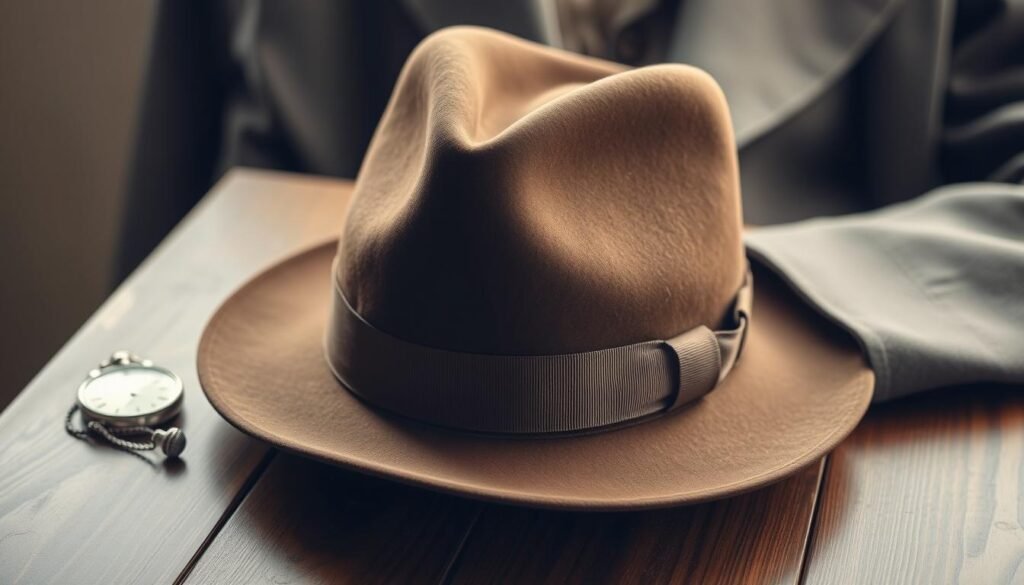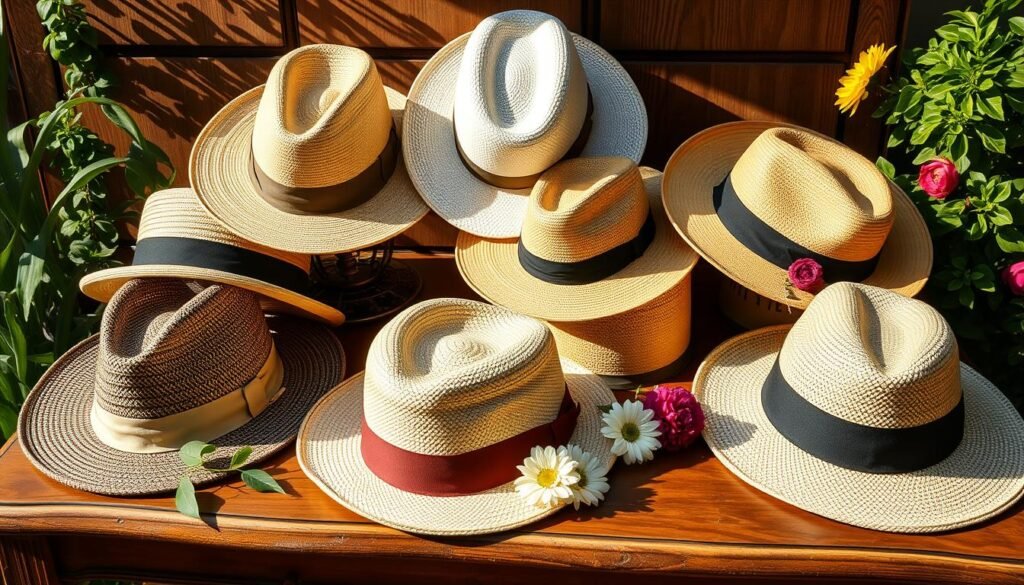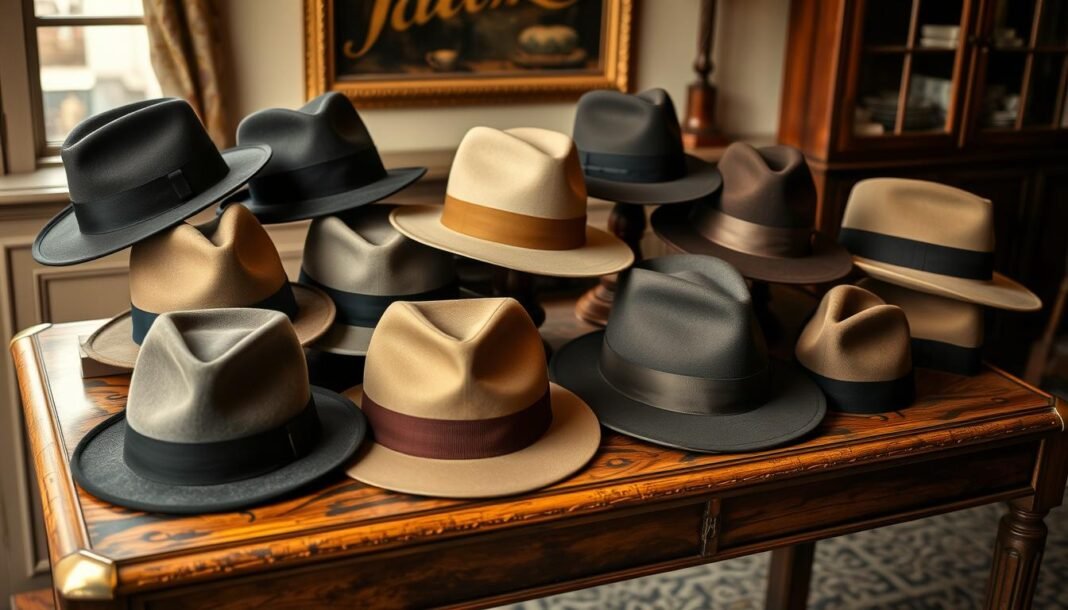Dive into the captivating world of 1930s men’s hats. Elegance, style, and tradition merge in this golden age of headwear. Explore iconic styles that shaped an era and still influence modern fashion today.
Discover the sophisticated fedora and distinguished homburg. Uncover the rich history and cultural impact of these timeless accessories. Learn how they symbolized social status and personal expression.
The 1930s saw hats as more than just practical necessities. They represented sophistication and were a key part of a man’s attire. Hollywood glamour and economic realities shaped the evolution of men’s headwear.
These iconic styles continue to captivate fashion enthusiasts worldwide. Their enduring appeal speaks to the timeless nature of 1930s hat fashion.
Key Takeaways
- Explore the rich history and cultural significance of 1930s men’s hats
- Discover the classic styles that defined the era, from the fedora to the homburg
- Understand how Hollywood and economic influences shaped the evolution of hat fashion
- Learn about the materials, craftsmanship, and iconic hat makers of the 1930s
- Uncover tips for preserving and collecting vintage 1930s headwear
The Golden Age of Men’s Headwear: Understanding 1930s Fashion
The 1930s was a crucial time for men’s fashion, especially headwear. Hats weren’t just accessories; they showed social status and personal style. From Gatsby hats to fedoras, 1930s headpieces reflected 1930s fashion, Hollywood’s impact, and economic conditions.
Social Significance of Hats in the 1930s
A man’s hat choice in the 1930s made a strong statement. Wearing a well-made fedora or Gatsby hat showed sophistication and social class. Hats were a way to express oneself and show one’s place in society.
Hollywood’s Influence on Hat Fashion
Movies greatly shaped men’s hat trends in the 1930s. Stars like Humphrey Bogart and Clark Gable made fedoras popular. Hollywood influence on 1930s fashion was clear, as screen glamour affected everyday men’s wardrobes.
Economic Impact on Hat Styles
The Great Depression affected men’s hat fashions in the 1930s. As money got tight, practical styles like newsboy and flat caps became popular. These casual hats were affordable alternatives to formal fedoras and Gatsby hats.
“Hats were an integral part of a man’s wardrobe in the 1930s, reflecting not only his personal style but also his social standing and economic status.”
The 1930s saw hats become more than just accessories. They were symbols of cultural and social identity. Headpieces from this era show the fashion trends and society of that important decade.
Essential 1930s Hats Men’s Styles and Characteristics
The 1930s saw a golden age of men’s headwear. Several iconic styles took center stage. The fedora, trilby, homburg, and newsboy cap each had unique appeal.
These hats reflected the era’s fashion and social divisions. They ranged from sophisticated to practical, suiting different classes and occasions.
The Iconic Fedora
The fedora was the pinnacle of 1930s men’s fashion. Its indented crown and curled brim oozed sophistication. Made from quality felt, it suited both casual and formal wear.
The fedora’s versatility made it popular across social classes. It became a symbol of refinement and style.
Trilby and Homburg: Gentleman’s Favorites
The trilby and homburg were go-to choices for distinguished gentlemen. The trilby had a smaller brim and higher crown.
It conveyed subtle elegance. The homburg featured a structured shape with a creased crown. It added a formal touch to any outfit.
The Casual Newsboy Cap
The newsboy cap was a working-class favorite. Made from tough tweed or cotton, it had a flat top and rounded brim.
This cap offered comfort and practicality. It was the everyday man’s headwear of choice.
| Hat Style | Key Characteristics | Typical Wearers |
|---|---|---|
| Fedora | Indented crown, gently curled brim | Upper and middle classes |
| Trilby | Smaller brim, slightly higher crown | Gentlemen |
| Homburg | Structured silhouette, pronounced crown crease | Formal gentlemen |
| Newsboy Cap | Flat top, rounded brim | Working class |
These 1930s hats shaped the era’s fashion landscape. They mirrored social and economic divisions of the time. Each style left a lasting mark on the decade’s fashion history.
The Iconic Fedora: Symbol of 1930s Sophistication
The fedora became a symbol of sophistication in the 1930s. Its distinctive silhouette and timeless appeal captured hearts across social classes. This versatile hat quickly became a staple accessory for men everywhere.
Fedora Brim Variations
The classic fedora has a medium-width brim angled slightly downward. This creates a sleek, refined look. Brim widths and shapes varied to suit individual tastes and regional trends.
Options ranged from narrow “snap brims” to wide, turned-up “open brims”. These variations allowed men to express their unique style through their fedoras.
Popular Fedora Colors and Materials
- Felt fedoras in black, gray, and brown were most common in the 1930s.
- High-end vintage fedora hats used luxurious rabbit or beaver fur.
- Straw fedoras in tan or white offered a summer-friendly option.
How to Wear a Fedora in Period Style
For an authentic 1930s look, pair your fedora with a tailored suit and polished shoes. Angle the hat slightly forward for a sophisticated, rakish appearance.
Add a tie or pocket square to enhance the period-inspired aesthetic. This completes the ensemble with a touch of vintage charm.

“The fedora was the ultimate symbol of urban sophistication and style during the 1930s, captivating the public’s imagination and setting the standard for masculine fashion.”
Homburg and Trilby: Distinguished Gentleman’s Choices
Two hats ruled 1930s men’s fashion: the homburg and the trilby. These styles were the top picks for classy gents. They stood out from the more casual fedora.
The homburg had a rounded crown with a distinct crease. It was a symbol of power and grace. Leaders and politicians often wore this hat to show their authority.
The trilby had a low crown and slightly upturned brim. It gave off a mysterious and stylish vibe. Artists and writers loved this hat for its creative flair.
| Homburg | Trilby |
|---|---|
| Rounded crown with distinct crease | Low-profile crown with slightly upturned brim |
| Favored by business leaders and politicians | Preferred by artists, writers, and creative types |
| Conveyed a sense of authority and refinement | Lent an air of mystery and urbane charm |
These hats were more than just accessories. They showed off personal style and social status. Famous figures like Winston Churchill and Cary Grant made these 1930s hats men’s styles popular.
Their influence inspired many men to wear these timeless hats. The homburg and trilby became symbols of great fashion sense.
“The hat is the ultimate statement of individuality. It’s the one thing you can put on your head that says, ‘This is who I am.'”
The Casual Appeal of Newsboy and Flat Caps
The 1930s saw a rise in casual, working-class headwear. Newsboy caps and flat caps became popular choices. They offered a relaxed alternative to dressier hats like fedoras and Homburgs.
Working-Class Heritage
Newsboy caps and flat caps originated in early 20th-century working-class communities. Laborers, tradesmen, and newsboys favored these practical and comfortable hats. Their unique designs symbolized the everyday working man.
Material Selection and Construction
These caps were made from durable, breathable fabrics like wool, tweed, or cotton. Newsboy caps had a rounded, brimmed crown. Flat caps featured a short, flat brim for shade and protection.
Craftsmen used traditional techniques like tailoring and stitching to create these caps. This ensured high-quality construction and long-lasting wear.
Styling Tips for Casual Caps
- Pair a newsboy cap or flat cap with a casual outfit for a classic 1930s look.
- Experiment with different colors and patterns to complement your personal style.
- Choose the right cap brim and crown size for a comfortable, flattering fit.
Newsboy caps and flat caps remain popular for vintage-inspired casual attire. These classic hats offer understated charm and working-class heritage. Wear them to capture the relaxed spirit of the 1930s.
Summer Classics: Boater and Panama Hats
In the 1930s, men sought lightweight headwear to beat the summer heat. Two iconic hats gained popularity: the boater and the Panama hat. These stylish options kept wearers cool and fashionable.
The boater is a straw hat with a flat crown and narrow brim. It was favored for outdoor activities like sailing and gardening. Its crisp lines captured the carefree 1930s spirit.
The Panama hat is woven from Carludovica palmata plant leaves. It offered tropical sophistication and sun protection. These hats maintained a refined, stylish appearance in warm weather.
Both hats have stood the test of time. They remain popular choices for warm-weather fashion today. These classic 1930s styles evoke timeless elegance with suits or casual wear.

“The boater and the Panama hat were the epitome of summer style in the 1930s, offering men a stylish and practical way to beat the heat.”
Materials and Manufacturing Techniques of the Era
The 1930s brought a new era of men’s fashion. Craftsmanship and materials in hat manufacturing defined the style of iconic headwear. This section explores the fascinating world of 1930s hat-making.
Traditional Felting Process
The felting process was the foundation of many 1930s hats. Skilled artisans meticulously cleaned, blended, and compressed felt hats into desired shapes. They used heat, moisture, and pressure to produce a durable, high-quality finish.
Quality Indicators and Craftsmanship
Well-made 1930s hats stood out due to subtle details. Expert vintage hat makers used fine stitching, reinforced brims, and precise sizing. These elements ensured a tailored, sophisticated look that lasted.
Material selection also marked quality craftsmanship. Premium wool felts and intricate hatbands were hallmarks of superior hats.
Popular Hat Makers of the 1930s
- Stetson: Renowned for their iconic fedoras and wide range of hat manufacturing expertise.
- Borsalino: The Italian brand synonymous with the classic Homburg, a favorite of distinguished gentlemen.
- Dobbs: An American company that dominated the market for fashionable felt hats, catering to both the working class and the elite.
| Hat Maker | Signature Styles | Notable Features |
|---|---|---|
| Stetson | Fedoras, Cowboy Hats | Durable, high-quality felts, Distinctive brims |
| Borsalino | Homburg, Trilby | Impeccable craftsmanship, Luxury materials |
| Dobbs | Newsboy Caps, Flat Caps | Affordable, versatile designs, Wide range of styles |
These hat manufacturing companies shaped the elegance of 1930s headwear. Their legacy still inspires fashion enthusiasts today. Their timeless designs continue to captivate hat lovers worldwide.
Preserving and Collecting Vintage 1930s Hats
Preserving 1930s men’s headwear is a passion for vintage hat enthusiasts. These iconic hats showcase the fashion and culture of a bygone era. Proper care and curation require expertise and attention to detail.
Identifying Authentic 1930s Hats
To build a meaningful vintage hat collection, learn to spot authentic 1930s styles. Look for tight weaves, sturdy construction, and well-defined shapes. Consult experienced collectors or antique dealers to verify your finds.
Proper Storage and Handling
Store 1930s hats men’s in a cool, dry place away from sunlight and moisture. Clean and condition materials regularly to prevent damage. Use archival-quality hat boxes or display stands to protect your prized possessions.
Restoration and Repair
Even well-cared-for vintage hats may need professional hat preservation services. Skilled artisans can reshape brims and replace sweatbands. Seek reputable specialists to keep your collection in top condition.
By following these tips, you’ll preserve 1930s men’s headwear for future generations. Your vintage hat collection will become a cherished treasure.
Conclusion
1930s men’s hats have an enduring charm that still influences modern fashion. The fedora, Homburg, and newsboy caps remain timeless silhouettes. These classic styles captivate fashion enthusiasts and the general public alike.
The 1930s marked a golden age for men’s headwear. Hats symbolized sophistication, social status, and cultural identity. Hollywood stars and economic realities shaped these iconic styles.
These hats are deeply rooted in 20th-century history. They showcase rich craftsmanship and design. Incorporating these classics into your look can elevate your personal style.
By wearing 1930s-inspired hats, you connect with a bygone era. You embrace elegance and timeless sophistication. Choose a custom fedora or vintage newsboy cap to add flair to your wardrobe.
